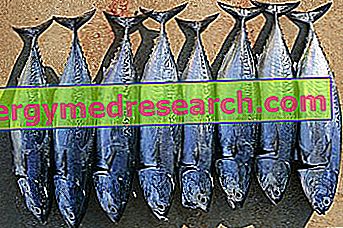Generality
Ornithine is an amino acid derivative with basic characteristics, produced by our organism starting from arginine, by intervention of the arginase enzyme with consequent production of urea.
Ornithine represents the amino acid initiator of the urea cycle, thanks to the possibility of interacting with carbamyl phosphate (carrier of the first amino group) to originate citrulline, which - coming out from the mitochondrial matrix - will be able to guarantee the continuation of the cycle itself .
This cycle, which takes place between the cytoplasm and the mitochondrial matrix of the hepatocytes, becomes particularly intense following prolonged fasting or high-protein diets, ie when the oxidation of amino acids becomes a very important energy source.
The intake of ornithine - which is mainly due to food of animal origin, from meat to fish and from eggs to milk - is therefore not essential for the human organism, given the presence of a metabolic pathway capable of providing its synthesis .
In particular, casein, an abundant protein in milk, is an excellent source for the extraction of ornithine, obtainable following enzymatic hydrolysis conducted at 37 ° C.

Indications
Why is ornithine used? What is it for?
Ornithine, falling within the urea cycle, contributes to the correct ammonia detoxification process, the accumulation of which could seriously compromise the individual's state of health.
Despite being an amino acid, ornithine is not encoded by the genetic code, but produced in the body following partial digestion of arginine, a conditionally essential amino acid that participates in protein synthesis, and whose production in extrahepatic cells is the primary purpose of urea cycle.
Leaving aside the conventional biochemical-nutritional role that is due to the chemical nature of this product, ornithine is becoming increasingly important in the scientific world, thanks to a series of studies that show its direct participation in various metabolic, physiological and hormonal pathways.
More precisely, preliminary studies have shown how ornithine can:
- Present an anti-fatigue role: in fact, doses of 2 g / day for 7 days and 6 g / day for a day, have proven to be effective in reducing the feeling of fatigue in healthy individuals who have undergone exercise, probably improving the excretion of ammonia ( involved in the genesis of the feeling of fatigue);
- Carry out an important anticatabolic role in the treatment of serious pathologies, such as burns, severe trauma and cachexia (in this case the doses administered are decidedly higher, up to 10 g / day), where it helps to optimize the processes of protein synthesis;
- As a precursor of the amino acid arginine, increase the secretion of nitric oxide, with a series of benefits both on the vascular system and indirectly on the musculature;
- Together with arginine, stimulate the secretion of GH and IGF-1 following intense physical exercise: property somewhat discussed and denied by different experimental evidences;
- Contribute to the production of polyamines, some of which have a protective function against the intestinal barrier.
Property and Effectiveness
What benefits has ornithine shown during the studies?
Commonly, there is a tendency to emphasize and publicize the purchase of ornithine-based products due to the alleged anabolic effect associated with the administration of this amino acid and arginine.
The search for this effect, demonstrated by a few studies and punctually denied by others, risks losing sight of another important effect, commonly accepted and equally important for the athlete; we are talking about the detoxifying effect.
In fact, it is known to all athletes how, following an intense physical exercise, perhaps protracted over time, there is a noticeable drop in performance (associated with the accumulation of ammonia derived above all from amino acid oxidation), which occurs under form of peripheral-muscular fatigue.
Several studies, considering the modest experiments currently present on ornithine and derivatives in sports, have shown how this amino acid - especially when associated with other protagonists of the urea cycle, such as arginine and citrulline - can significantly improve the excretion of ammonia, consequently reducing the feeling of fatigue.
The presence of ornithine supplements such as ornithine alpha-keto glutarate would also justify the ergogenic action, attributable to the salt of ornithine.
Doses and method of use
How to use ornithine
The dosages proposed in the literature evidently vary according to the needs and aims of the integration.
In sports, the most effective and characterized dosage of ornithine is that of 2 grams per day in the training session and 6 g per day on the day of the competition.
In the clinical setting, on the other hand, the anticatabolic and anticachectic effect, reserved for patients suffering from severe burns or subjected to major surgery, would have been observed at decidedly higher dosages, such as to touch the permitted limit.
In the experimental field, the dosages used tend to grow significantly, reaching even 15 g per day, with all the side effects of the case.
The intake of ornithine should take place on an empty stomach, in order to avoid any competitive phenomenon that can reduce the absorption of this amino acid.
Unfortunately, there are still no significant studies, neither from a pharmacokinetic point of view, nor from a biological point of view, that can guide the professional and the user in developing particularly effective supplementary protocols.
Side effects
The use of ornithine, at doses higher than 10 g per day, has been associated with the appearance of gastrointestinal reactions such as nausea, abdominal cramps and diarrhea.
Contraindications
When should ornithine not be used?
The use of ornithine is contraindicated in subjects hypersensitive to the active ingredient and in patients suffering from rare genetic disorders, such as ornithine deficiency delta aminotransferase.
Pharmacological Interactions
Which drugs or foods can change the effect of ornithine?
There are currently no known pharmacological interactions between ornithine and other active ingredients.
Precautions for use
What do you need to know before taking ornithine?
Given the lack of studies, the use of ornithine supplements is generally contraindicated during pregnancy and breastfeeding.



